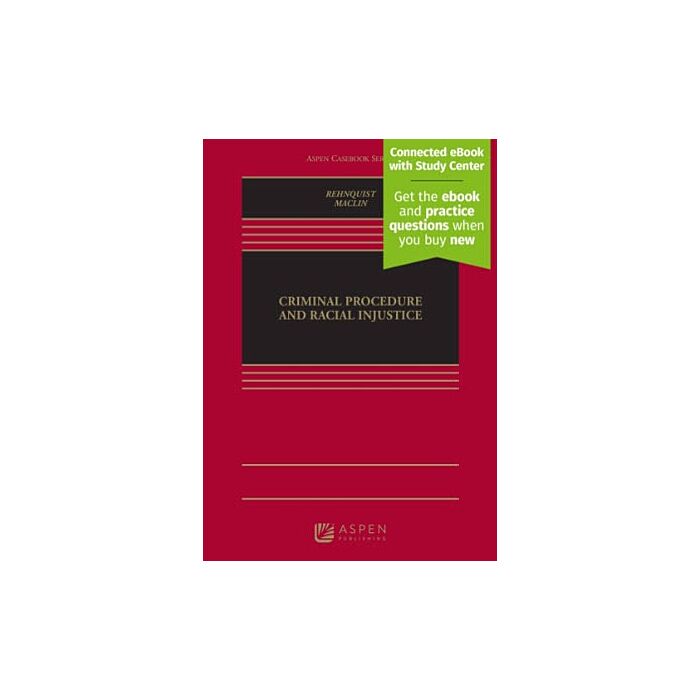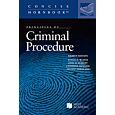Order by phone 1-866-808-5635 (M-F 10am - 4pm CST) Help/FAQs / LawRewards / Gift Certificates / Sell Us Your Law School Textbooks
-
Attorney
-
A-B
- A
- Accounting & Finance
- Administrative Law
- Admiralty Law
- Age & Gender Law
- Agency & Partnership Law
- Agricultural Law
- Alternative Dispute Resolution
- Animal Law
- Antitrust Law
- Appellate Advocacy
- Arbitration Law
- Art Law
- Audio Items
- Aviation & Space Law
- B
- Banking Law
- Bankruptcy Law
- Bar Exam Preparation
- Biotech Law
- Business Associations & Organizations
- Business Law
-
C-D
- C
- Civil Law
- Civil Procedure Law
- Civil Rights Law
- Class Action Law
- Commercial Law
- Commercial Paper
- Communications Law
- Community Property Law
- Comparative Law
- Conflict of Laws
- Constitutional Law
- Construction Law
- Consumer Law
- Contract Law
- Copyright Law
- Corporate Finance Law
- Corporate Tax Law
- Corporations Law
- Criminal Justice
- Criminal Law
- Criminal Procedure
- D
- Debtor-Creditor Law
- Defamation Law
- Disability Law
- Discrimination Law
- Divorce Law
- Domestic Relations Law
- Download Items
- Drug Law
-
E-F
- E
- Economics & Law
- Education Law
- Elder Law
- Election Law
- Employee Benefits & ERISA Law
- Employment Law
- Energy Law
- Entertainment Law
- Environmental Law
- Estate & Gift Tax Law
- Estates Law
- Evidence Law
- F
- Family Law
- Federal Courts & Jurisdiction
- Federal Income Tax Law
- Finance Law
- First Amendment Law
- First Year Law School Guides
- Flashcard Items
- Franchise Law
- Future Interests
-
G-J
- G
- Gambling Law
- General Legal Non-Fiction
- General Legal Reference
- Governmental Law
- Gun Law
- H
- Health & Health Care Law
- History & Law
- Housing Law
- Human Rights Law
- I
- Immigration Law
- Injunctions
- Insurance Law
- Intellectual Property Law
- International Business Transactions
- International Law
- Internet Law & Cyber Law
- J
- Jurisprudence
- Jury
- Juvenile Law
-
L-M
- L
- Labor Law
- Land Use Law
- Landlord & Tenant Law
- Law School Exam Guides
- Lawyering Skills
- Legal Career Guides
- Legal Dictionaries
- Legal Ethics
- Legal Malpractice
- Legal Philosophy
- Legal Practice Management
- Legal Research
- Legal Writing
- Legislation Law
- Litigation Law
- LSAT Exam Preparation
- M
- Maritime Law
- Mass Media Law
- Mediation Law
- Medical Liability Law
- Mergers & Acquisitions
- Military & Nat'l Security Law
- MPRE Exam Preparation
- Municipal Law
- Music Law
-
N-P
- N
- Native American Law
- Natural Resources Law
- Negotiable Instrument Law
- Non-Profit Organization Law
- O
- Oil & Gas Law
- P
- Partnerships & LLCs
- Paralegal Titles
- Patent Law
- Payment Systems Law
- Penal Law
- Personal Injury Law
- Pre-Law School Preparation
- Pre-Trial
- Privacy Law
- Probate Law
- Products Liability Law
- Professional Responsibility
- Property Law
-
R-Z
- R
- Real Estate Law
- Regulatory Law
- Religion & Law
- Remedies Law
- S
- Sales & Leases of Goods
- Secured Transactions
- Securities Regulation
- Sexual Orientation Law
- Software Items
- Sports Law
- T
- Transportation Law
- Tax Law
- Technology Law
- Tort Law
- Toxic Tort Law
- Trade Law
- Trademark Law
- Travel Law
- Trial Advocacy
- Trusts
- Trusts Law
- U
- U.C.C.
- W
- White Collar Crime
- Wills
- Z
- Zoning Law
-
A-B
-
Do-It-Yourself Law
-
A-B
- A
- Accounting & Finance
- Administrative Law
- Admiralty Law
- Age & Gender Law
- Agency & Partnership Law
- Alternative Dispute Resolution
- Animal Law
- Antitrust Law
- Appellate Advocacy
- Arbitration Law
- Art Law
- Audio Items
- Aviation Law
- B
- Banking Law
- Bankruptcy Law
- Bar Exam Preparation
- Biotech Law
- Business Associations & Organizations
- Business Law
-
C-D
- C
- Civil Procedure Law
- Civil Rights Law
- Class Action Law
- Commercial Law
- Commercial Paper
- Communications Law
- Community Property Law
- Comparative Law
- Conflict of Laws
- Constitutional Law
- Construction Law
- Consumer Law
- Contract Law
- Copyright Law
- Corporate Finance Law
- Corporate Tax Law
- Corporations Law
- Criminal Justice
- Criminal Law
- Criminal Procedure
- D
- Debtor-Creditor Law
- Disability Law
- Discrimination Law
- Divorce Law
- Domestic Relations Law
- Download Items
-
E-F
- E
- Economics & Law
- Education Law
- Elder Law
- Employee Benefits & ERISA Law
- Employment Law
- Energy Law
- Entertainment Law
- Environmental Law
- Estate & Gift Tax Law
- Estates Law
- Evidence Law
- F
- Family Law
- Federal Courts & Jurisdiction
- Federal Income Tax Law
- Finance Law
- First Amendment Law
- First Year Law School Guides
- Flashcard Items
- Franchise Law
- Future Interests
-
G-J
- G
- Gambling Law
- General Legal Non-Fiction
- General Legal Reference
- Governmental Law
- H
- Health & Health Care Law
- History & Law
- Human Rights Law
- I
- Immigration Law
- Injunctions
- Insurance Law
- Intellectual Property Law
- International Business Transactions
- International Law
- Internet Law & Cyber Law
- J
- Jurisprudence
- Juvenile Law
-
L-M
- L
- Labor Law
- Land Use Law
- Landlord & Tenant Law
- Law School Exam Guides
- Lawyering Skills
- Legal Career Guides
- Legal Dictionaries
- Legal Ethics
- Legal Philosophy
- Legal Practice Management
- Legal Research
- Legal Writing
- Legislation Law
- Litigation Law
- LSAT Exam Preparation
- M
- Maritime Law
- Mass Media Law
- Mediation Law
- Medical Liability Law
- Mergers & Acquisitions
- Military & Nat'l Security Law
- MPRE Exam Preparation
- Municipal Law
- Music Law
-
N-P
- N
- Native American Law
- Natural Resources Law
- Negotiable Instrument Law
- Non-Profit Organization Law
- O
- Oil & Gas Law
- P
- Partnerships & LLCs
- Patent Law
- Payment Systems Law
- Penal Law
- Personal Injury Law
- Pre-Law School Preparation
- Pre-Trial
- Privacy Law
- Probate Law
- Products Liability Law
- Professional Responsibility
- Property Law
-
R-Z
- R
- Real Estate Law
- Religion & Law
- Remedies Law
- S
- Sales & Leases of Goods
- Secured Transactions
- Securities Regulation
- Sexual Orientation Law
- Software Items
- Sports Law
- T
- Tax Law
- Technology Law
- Tort Law
- Toxic Tort Law
- Trade Law
- Trademark Law
- Travel Law
- Trial Advocacy
- Trusts
- Trusts Law
- U
- U.C.C.
- W
- White Collar Crime
- Wills
- Z
- Zoning Law
-
A-B
-
Law Student
-
A-B
- A
- Accounting & Finance
- Administrative Law
- Admiralty Law
- Age & Gender Law
- Agency & Partnership Law
- Agricultural Law
- Alternative Dispute Resolution
- Animal Law
- Antitrust Law
- Appellate Advocacy
- Arbitration Law
- Art Law
- Audio Items
- Aviation & Space Law
- B
- Banking Law
- Bankruptcy Law
- Bar Exam Preparation
- Biotech Law
- Business Associations & Organizations
- Business Law
-
C-D
- C
- Civil Law
- Civil Procedure Law
- Civil Rights Law
- Class Action Law
- Commercial Law
- Commercial Paper
- Communications Law
- Community Property Law
- Comparative Law
- Conflict of Laws
- Constitutional Law
- Construction Law
- Consumer Law
- Contract Law
- Copyright Law
- Corporate Finance Law
- Corporate Tax Law
- Corporations Law
- Criminal Justice
- Criminal Law
- Criminal Procedure
- D
- Debtor-Creditor Law
- Defamation Law
- Disability Law
- Discrimination Law
- Divorce Law
- Domestic Relations Law
- Download Items
- Drug Law
-
E-F
- E
- Economics & Law
- Education Law
- Elder Law
- Election Law
- Employee Benefits & ERISA Law
- Employment Law
- Energy Law
- Entertainment Law
- Environmental Law
- Estate & Gift Tax Law
- Estates Law
- Evidence Law
- F
- Family Law
- Federal Courts & Jurisdiction
- Federal Income Tax Law
- Finance Law
- First Amendment Law
- First Year Law School Guides
- Flashcard Items
- Franchise Law
- Future Interests
-
G-J
- G
- Gambling Law
- General Legal Non-Fiction
- General Legal Reference
- Governmental Law
- Gun Law
- H
- Health & Health Care Law
- History & Law
- Human Rights Law
- Housing Law
- I
- Immigration Law
- Injunctions
- Insurance Law
- Intellectual Property Law
- International Business Transactions
- International Law
- Internet Law & Cyber Law
- J
- Jurisprudence
- Jury
- Juvenile Law
-
L-M
- L
- Labor Law
- Land Use Law
- Landlord & Tenant Law
- Law School Exam Guides
- Lawyering Skills
- Legal Career Guides
- Legal Dictionaries
- Legal Ethics
- Legal Malpractice
- Legal Philosophy
- Legal Practice Management
- Legal Research
- Legal Writing
- Legislation Law
- Litigation Law
- LSAT Exam Preparation
- M
- Maritime Law
- Mass Media Law
- Mediation Law
- Medical Liability Law
- Mergers & Acquisitions
- Military & Nat'l Security Law
- MPRE Exam Preparation
- Municipal Law
- Music Law
-
N-P
- N
- Native American Law
- Natural Resources Law
- Negotiable Instrument Law
- Non-Profit Organization Law
- O
- Oil & Gas Law
- P
- Paralegal Titles
- Partnerships & LLCs
- Patent Law
- Payment Systems Law
- Penal Law
- Personal Injury Law
- Pre-Law School Preparation
- Pre-Trial
- Privacy Law
- Probate Law
- Products Liability Law
- Professional Responsibility
- Property Law
-
R-Z
- R
- Real Estate Law
- Regulatory Law
- Religion & Law
- Remedies Law
- S
- Sales & Leases of Goods
- Secured Transactions
- Securities Regulation
- Sexual Orientation Law
- Software Items
- Sports Law
- T
- Tax Law
- Technology Law
- Tort Law
- Toxic Tort Law
- Trade Law
- Trademark Law
- Transportation Law
- Travel Law
- Trial Advocacy
- Trusts
- Trusts Law
- U
- U.C.C.
- W
- White Collar Crime
- Wills
- Z
- Zoning Law
-
A-B
-
Paralegal
-
A-B
- A
- Accounting & Finance
- Administrative Law
- Admiralty Law
- Age & Gender Law
- Agency & Partnership Law
- Alternative Dispute Resolution
- Animal Law
- Antitrust Law
- Appellate Advocacy
- Arbitration Law
- Art Law
- Audio Items
- Aviation Law
- B
- Banking Law
- Bankruptcy Law
- Bar Exam Preparation
- Biotech Law
- Business Associations & Organizations
- Business Law
-
C-D
- C
- Civil Procedure Law
- Civil Rights Law
- Class Action Law
- Commercial Law
- Commercial Paper
- Communications Law
- Community Property Law
- Comparative Law
- Conflict of Laws
- Constitutional Law
- Construction Law
- Consumer Law
- Contract Law
- Copyright Law
- Corporate Finance Law
- Corporate Tax Law
- Corporations Law
- Criminal Justice
- Criminal Law
- Criminal Procedure
- D
- Debtor-Creditor Law
- Disability Law
- Discrimination Law
- Divorce Law
- Domestic Relations Law
- Download Items
-
E-F
- E
- Economics & Law
- Education Law
- Elder Law
- Employee Benefits & ERISA Law
- Employment Law
- Energy Law
- Entertainment Law
- Environmental Law
- Estate & Gift Tax Law
- Estates Law
- Evidence Law
- F
- Family Law
- Federal Courts & Jurisdiction
- Federal Income Tax Law
- Finance Law
- First Amendment Law
- First Year Law School Guides
- Flashcard Items
- Franchise Law
- Future Interests
-
G-J
- G
- Gambling Law
- General Legal Non-Fiction
- General Legal Reference
- Governmental Law
- H
- Health & Health Care Law
- History & Law
- Human Rights Law
- I
- Immigration Law
- Injunctions
- Insurance Law
- Intellectual Property Law
- International Business Transactions
- International Law
- Internet Law & Cyber Law
- J
- Jurisprudence
- Juvenile Law
-
L-M
- L
- Labor Law
- Land Use Law
- Landlord & Tenant Law
- Law School Exam Guides
- Lawyering Skills
- Legal Career Guides
- Legal Dictionaries
- Legal Ethics
- Legal Philosophy
- Legal Practice Management
- Legal Research
- Legal Writing
- Legislation Law
- Litigation Law
- LSAT Exam Preparation
- M
- Maritime Law
- Mass Media Law
- Mediation Law
- Medical Liability Law
- Mergers & Acquisitions
- Military & Nat'l Security Law
- MPRE Exam Preparation
- Municipal Law
- Music Law
-
N-P
- N
- Native American Law
- Natural Resources Law
- Negotiable Instrument Law
- Non-Profit Organization Law
- O
- Oil & Gas Law
- P
- Partnerships & LLCs
- Patent Law
- Payment Systems Law
- Penal Law
- Personal Injury Law
- Pre-Law School Preparation
- Pre-Trial
- Privacy Law
- Probate Law
- Products Liability Law
- Professional Responsibility
- Property Law
-
R-Z
- R
- Real Estate Law
- Religion & Law
- Remedies Law
- S
- Sales & Leases of Goods
- Secured Transactions
- Securities Regulation
- Sexual Orientation Law
- Software Items
- Sports Law
- T
- Tax Law
- Technology Law
- Tort Law
- Toxic Tort Law
- Trade Law
- Trademark Law
- Travel Law
- Trial Advocacy
- Trusts
- Trusts Law
- U
- U.C.C.
- W
- White Collar Crime
- Wills
- Z
- Zoning Law
-
A-B
-
Pre-Law Student
-
A-B
- A
- Accounting & Finance
- Administrative Law
- Admiralty Law
- Age & Gender Law
- Agency & Partnership Law
- Alternative Dispute Resolution
- Animal Law
- Antitrust Law
- Appellate Advocacy
- Arbitration Law
- Art Law
- Audio Items
- Aviation Law
- B
- Banking Law
- Bankruptcy Law
- Bar Exam Preparation
- Biotech Law
- Business Associations & Organizations
- Business Law
-
C-D
- C
- Civil Procedure Law
- Civil Rights Law
- Class Action Law
- Commercial Law
- Commercial Paper
- Communications Law
- Community Property Law
- Comparative Law
- Conflict of Laws
- Constitutional Law
- Construction Law
- Consumer Law
- Contract Law
- Copyright Law
- Corporate Finance Law
- Corporate Tax Law
- Corporations Law
- Criminal Justice
- Criminal Law
- Criminal Procedure
- D
- Debtor-Creditor Law
- Disability Law
- Discrimination Law
- Divorce Law
- Domestic Relations Law
- Download Items
-
E-F
- E
- Economics & Law
- Education Law
- Elder Law
- Employee Benefits & ERISA Law
- Employment Law
- Energy Law
- Entertainment Law
- Environmental Law
- Estate & Gift Tax Law
- Estates Law
- Evidence Law
- F
- Family Law
- Federal Courts & Jurisdiction
- Federal Income Tax Law
- Finance Law
- First Amendment Law
- First Year Law School Guides
- Flashcard Items
- Franchise Law
- Future Interests
-
G-J
- G
- Gambling Law
- General Legal Non-Fiction
- General Legal Reference
- Governmental Law
- H
- Health & Health Care Law
- History & Law
- Human Rights Law
- I
- Immigration Law
- Injunctions
- Insurance Law
- Intellectual Property Law
- International Business Transactions
- International Law
- Internet Law & Cyber Law
- J
- Jurisprudence
- Juvenile Law
-
L-M
- L
- Labor Law
- Land Use Law
- Landlord & Tenant Law
- Law School Exam Guides
- Lawyering Skills
- Legal Career Guides
- Legal Dictionaries
- Legal Ethics
- Legal Philosophy
- Legal Practice Management
- Legal Research
- Legal Writing
- Legislation Law
- Litigation Law
- LSAT Exam Preparation
- M
- Maritime Law
- Mass Media Law
- Mediation Law
- Medical Liability Law
- Mergers & Acquisitions
- Military & Nat'l Security Law
- MPRE Exam Preparation
- Municipal Law
- Music Law
-
N-P
- N
- Native American Law
- Natural Resources Law
- Negotiable Instrument Law
- Non-Profit Organization Law
- O
- Oil & Gas Law
- P
- Partnerships & LLCs
- Patent Law
- Payment Systems Law
- Penal Law
- Personal Injury Law
- Pre-Law School Preparation
- Pre-Trial
- Privacy Law
- Probate Law
- Products Liability Law
- Professional Responsibility
- Property Law
-
R-Z
- R
- Real Estate Law
- Religion & Law
- Remedies Law
- S
- Sales & Leases of Goods
- Secured Transactions
- Securities Regulation
- Sexual Orientation Law
- Software Items
- Sports Law
- T
- Tax Law
- Technology Law
- Tort Law
- Toxic Tort Law
- Trade Law
- Trademark Law
- Travel Law
- Trial Advocacy
- Trusts
- Trusts Law
- U
- U.C.C.
- W
- White Collar Crime
- Wills
- Z
- Zoning Law
-
A-B
- Menu
- Account
-
Attorney
-
A-B
- A
- B
-
C-D
-
C
- Civil Law
- Civil Procedure Law
- Civil Rights Law
- Class Action Law
- Commercial Law
- Commercial Paper
- Communications Law
- Community Property Law
- Comparative Law
- Conflict of Laws
- Constitutional Law
- Construction Law
- Consumer Law
- Contract Law
- Copyright Law
- Corporate Finance Law
- Corporate Tax Law
- Corporations Law
- Criminal Justice
- Criminal Law
- Criminal Procedure
- D
-
C
-
E-F
- E
- F
-
G-J
- G
- H
- I
- J
-
L-M
- L
- M
-
N-P
- N
- O
- P
-
R-Z
- R
- S
- T
- U
- W
- Z
-
A-B
-
Do-It-Yourself Law
-
A-B
- A
- B
-
C-D
-
C
- Civil Procedure Law
- Civil Rights Law
- Class Action Law
- Commercial Law
- Commercial Paper
- Communications Law
- Community Property Law
- Comparative Law
- Conflict of Laws
- Constitutional Law
- Construction Law
- Consumer Law
- Contract Law
- Copyright Law
- Corporate Finance Law
- Corporate Tax Law
- Corporations Law
- Criminal Justice
- Criminal Law
- Criminal Procedure
- D
-
C
-
E-F
- E
- F
-
G-J
- G
- H
- I
- J
-
L-M
- L
- M
-
N-P
- N
- O
- P
-
R-Z
- R
- S
- T
- U
- W
- Z
-
A-B
-
Law Student
-
A-B
- A
- B
-
C-D
-
C
- Civil Law
- Civil Procedure Law
- Civil Rights Law
- Class Action Law
- Commercial Law
- Commercial Paper
- Communications Law
- Community Property Law
- Comparative Law
- Conflict of Laws
- Constitutional Law
- Construction Law
- Consumer Law
- Contract Law
- Copyright Law
- Corporate Finance Law
- Corporate Tax Law
- Corporations Law
- Criminal Justice
- Criminal Law
- Criminal Procedure
- D
-
C
-
E-F
- E
- F
-
G-J
- G
- H
- I
- J
-
L-M
- L
- M
-
N-P
- N
- O
- P
-
R-Z
- R
- S
- T
- U
- W
- Z
-
A-B
-
Paralegal
-
A-B
- A
- B
-
C-D
-
C
- Civil Procedure Law
- Civil Rights Law
- Class Action Law
- Commercial Law
- Commercial Paper
- Communications Law
- Community Property Law
- Comparative Law
- Conflict of Laws
- Constitutional Law
- Construction Law
- Consumer Law
- Contract Law
- Copyright Law
- Corporate Finance Law
- Corporate Tax Law
- Corporations Law
- Criminal Justice
- Criminal Law
- Criminal Procedure
- D
-
C
-
E-F
- E
- F
-
G-J
- G
- H
- I
- J
-
L-M
- L
- M
-
N-P
- N
- O
- P
-
R-Z
- R
- S
- T
- U
- W
- Z
-
A-B
-
Pre-Law Student
-
A-B
- A
- B
-
C-D
-
C
- Civil Procedure Law
- Civil Rights Law
- Class Action Law
- Commercial Law
- Commercial Paper
- Communications Law
- Community Property Law
- Comparative Law
- Conflict of Laws
- Constitutional Law
- Construction Law
- Consumer Law
- Contract Law
- Copyright Law
- Corporate Finance Law
- Corporate Tax Law
- Corporations Law
- Criminal Justice
- Criminal Law
- Criminal Procedure
- D
-
C
-
E-F
- E
- F
-
G-J
- G
- H
- I
- J
-
L-M
- L
- M
-
N-P
- N
- O
- P
-
R-Z
- R
- S
- T
- U
- W
- Z
-
A-B
Order by phone 1-866-808-5635 (M-F 9am-5pm CST)
Criminal Procedure and Racial Injustice (w/ Connected eBook with Study Center) (Rental)
- Edition : 1st ed., 2024
- Author(s) : Rehnquist, Maclin
Log in or create an account to get 247 LawReward points on this purchase!
-
Criminal Procedure and Racial Injustice (w/ Connected eBook with Study Center)
- ISBN: 9798889061144
- SKU: 10320
- Condition: New
- Format: Hardcover/Access Code
$324.48
List Price: $338.00
- This item ships within one business day.
-
Criminal Procedure and Racial Injustice (w/ Connected eBook with Study Center) (Instant Digital Access Code Only)
- SKU: 10320E
- Format: Digital Access Code Only
- Instant Access!
-
Criminal Procedure and Racial Injustice (w/ Connected eBook with Study Center) (Rental)
- ISBN: 9798889061144
- SKU: 10320C
- Condition: New
- Format: Hardcover/Access Code
- This item ships within one business day.
- A pristine, unused rental copy of the textbook (which must be returned by the end of your course semester), with no highlighting or writing restrictions,
- Immediate, lifetime access to the digital copy of that edition of the textbook, and
- Access to the Interactive Study Center where you can utilize outlining tools, self-assessment tools that will show you your strengths and weaknesses, and online study aids including curated excerpts and practice questions from leading study aids such as Examples & Explanations and Glannon Guides.
What is a Connected Casebook?
In an effort to offer more affordable, and powerful, law school textbook options to law students, Aspen Publishers/Wolters Kluwer Legal Education is now offering Connected Casebook versions of some of their textbook titles. With Connected Casebook versions, you get all of this:
What is the benefit of a Connected Casebook?
With Connected Casebook titles, you really do get more for less! Connected Casebook items are discounted up to 25% off of the price of their respective non-Connected Casebook versions.
Want more info on Connected Casebook? Click here!
Purchase or rental of a new Connected eBook with Study Center includes a new print textbook PLUS a full ebook version of your text; outlining and case briefing tools; a variety of practice questions; straightforward explanations of complex legal concepts; and progress indicators to help you better allocate your study time.
Order now to get INSTANT ACCESS to the ebook and other digital tools — just redeem the access code sent in your order confirmation email!
Criminal Procedure and Racial Injustice brings a sustained emphasis on race to the traditional content of criminal procedure. Rather than a wholesale revision of the standard criminal procedure fare, it amply covers all the familiar subject matter areas while integrating into those topics the roles that racial prejudice and racial disparities have played and continue to play in the criminal justice system.
For example, the Investigative volume of the book looks deeply into the role that race—mostly implicitly—played not only in the Court’s written decision of Terry v. Ohio but also in the trial and appellate advocacy that produced that decision, including the direct and cross-examinations in the suppression hearing.
The Adjudicative volume looks closely at the role that race has played in the makeup of juries in criminal trials, including defense counsel’s ability to pursue voir dire questioning of potential jurors to screen for racial bias; the historical use by prosecutors of peremptory challenges to eliminate Black potential jurors, and the attempt to eliminate that practice by the Supreme Court in Batson v. Kentucky; and the perils of cross-race eyewitness identification in criminal trials.
A secondary focus of the book is lawyering—the decisions and tactics of the prosecutors and defense lawyers that undergird the cases in the book. To that end, the plentiful Notes and Questions following the cases provoke thought and discussion not only on the relevant legal doctrine and the racial implications of the doctrine, but also on the choices made by the prosecutors and defense counsel.
Order now to get INSTANT ACCESS to the full ebook version of the text; outlining and case briefing tools; a variety of practice questions; and other resources — just redeem the access code sent in your order confirmation email!
Criminal Procedure and Racial Injustice brings a sustained emphasis on race to the traditional content of criminal procedure. Rather than a wholesale revision of the standard criminal procedure fare, it amply covers all the familiar subject matter areas while integrating into those topics the roles that racial prejudice and racial disparities have played and continue to play in the criminal justice system.
For example, the Investigative volume of the book looks deeply into the role that race—mostly implicitly—played not only in the Court’s written decision of Terry v. Ohio but also in the trial and appellate advocacy that produced that decision, including the direct and cross-examinations in the suppression hearing.
The Adjudicative volume looks closely at the role that race has played in the makeup of juries in criminal trials, including defense counsel’s ability to pursue voir dire questioning of potential jurors to screen for racial bias; the historical use by prosecutors of peremptory challenges to eliminate Black potential jurors, and the attempt to eliminate that practice by the Supreme Court in Batson v. Kentucky; and the perils of cross-race eyewitness identification in criminal trials.
A secondary focus of the book is lawyering—the decisions and tactics of the prosecutors and defense lawyers that undergird the cases in the book. To that end, the plentiful Notes and Questions following the cases provoke thought and discussion not only on the relevant legal doctrine and the racial implications of the doctrine, but also on the choices made by the prosecutors and defense counsel.
Related Products
-
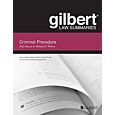
Gilbert Law Summaries: Criminal Procedure
List Price $61.00 Our Low Price $58.56 -
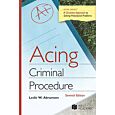
Acing Criminal Procedure
List Price $55.00 Our Low Price $52.80 -
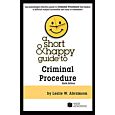
A Short & Happy Guide to Criminal Procedure
List Price $28.00 Our Low Price $27.44

